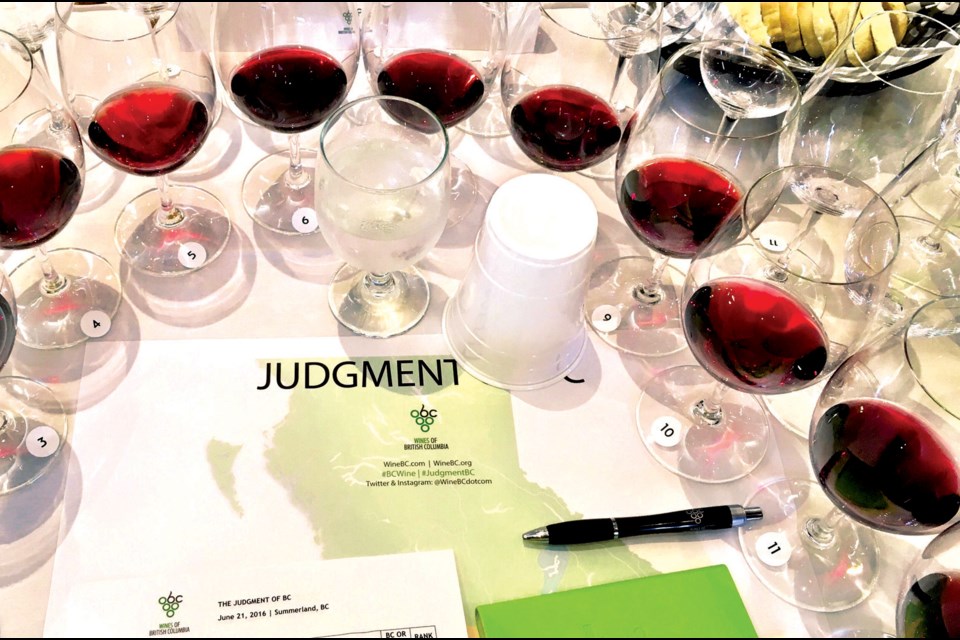Earlier this summer, the second (now possibly annual) Judgment of BC took place in Summerland, B.C.
Last year’s event took place under the unofficial patronage of U.K. critic and Decanter columnist Steven Spurrier. He’s the former Paris-based wine merchant who staged the now immortalized Judgment of Paris, which put California on the world wine map and challenged the long-held notion of French domination.
This year’s “judgment” welcomed Britain’s Jamie Goode, and focused on riesling and pinot noir. Both are varieties that B.C. makes increasingly well, and are worthy contenders.
Like the first, the second annual blind taste-off (in which I participated) lined up some of B.C.’s best beside wines of comparable quality from elsewhere. The process is simple: each judge scores all the wines in order of preference. The results are tallied and the wines with the weightiest scores across the board prevail.
It’s a process that balances out very fairly when the assessments of all 31 international and national judges are tabulated.
The most important take-away is that these B.C. Wine Institute-hosted mega-tastings have shown what they were intended to, which is that there is certainly no shortage of B.C. wines that show on par with well-chosen international comparisons.
Yes, there’s always an element of the jingoistic: lots of B.C. people were disappointed at what they felt to be poor showings for chardonnay last year and, I suspect, for pinot noir this year. But “winning” is not the point.
More important is how B.C. – and the Okanagan Valley in particular – has captured the attention of the likes of Spurrier and Goode, who now feature B.C. wines in their potent worldwide coverage, and who have been instrumental (through Decanter) in helping to launch a good number into the U.K. market.
When the riesling scores were tallied, B.C.’s CedarCreek Platinum Block 3 Riesling 2012 placed second, closely behind Max Ferd.
Richter Graacher Himmelreich Riesling Kabinett 2013 from the Mosel Valley, Germany came first, with Wild Goose Stoney Slope Riesling 2013 third, and Syncromesh Storm Haven 2015, sixth.
In the pinot flight, B.C. wines wound up solidly and respectably right in the middle, with wins from Haywire (Canyonview 2014), Meyer (Reimer 2012), Quails Gate (Richard’s Block 2013), Blue Mountain (Reserve 2013), JoieFarm (En Famille 2012) placing fourth through eighth respectively. Top score was Bouchard Père Premier Cru Beaune Clos de la Mousse Monopole 2012 (Burgundy).
Many of these wines are sold out. But the good news is that you can track down the current releases of several of these contenders.
Cedar Creek Platinum Riesling Block 3 2015 is a superb example of how good B.C. Riesling can be. It sports lifted floral, citrus and orchard notes up-front with some stony notes, followed by a lemon-lime, mineral-toned palate, buoyed by mouth-watering acidity with a powerful but elegant close (92 points, and it’s a deal at $24.95).
JoieFarm En Famille 2013 tempts with lifted red fruit, cherry and strawberry notes before a supple, cherry-chocolate palate, with a slightly earthy edge, lush and sleek, with supple tannins, well-balanced fruit and acidity with a lingering, gently savoury finish (92 points, $29.90). Certainly in world Pinot terms, another real deal.
Tim Pawsey writes about wine for numerous publications and online as the Hired Belly at hiredbelly.com. He can be reached via email at [email protected].



